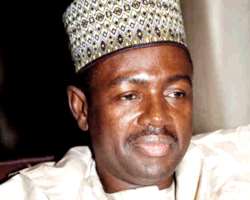FG earmarks N457bn for transmission infrastructure, targets 16,000MW capacity

In order to prepare the country's electricity transmission infrastructure for growing generating capacity, the Federal Government will be investing $2.86bn (N457.6bn) in building up transmission capacity between now and 2017.
The Minister of Information, Mr. Labaran Maku, said a transmission expansion blue print prepared by the Presidential Action Committee on Power had committed the government to a transmission capacity of 16,000MW.
The minister spoke in Abuja on Tuesday at a news conference.
He said the government was committed to funding the programme, which will cost $2.86bn.
Maku said funds for the transmission projects would be sourced from the African Development Bank, $150m; World Bank, $290m; and Eurobond of $150m.
He listed other funding sources are a $500m loan from the China Export Import Bank; proceeds from the sale of the National Integrated Power Plants, $1.6bn; and budgetary appropriation, $170m.
Gushing with enthusiasm, Maku announced that the end of darkness was near in Nigeria.
According to him, different steps taken by the government would soon begin to yield results, but pleaded with the citizens to exercise some patience as time was still needed to usher in a new era.
He said, 'The distribution companies are going to ensure that there are meters and the meters will be prepaid so that nobody will come and charge you for darkness, which was the case in the past. You buy your credit and when it finishes, your light goes off. You don't need anybody to come and disconnect you.
'You can be sure now that you will pay for every light you use. People will ensure that they put off light that they don't need. The importance of this is that the power you don't use will go to the industry. When you waste electricity, it is a national waste, not just to the person that is paying for it. If you save it, it goes into production.
'Government will subsidise power for the poor people. The rural dwellers and poor urban dwellers; there is a subsidy for you. In the course of the new tariff, which will come in the beginning of the market, the tariff will not take electricity beyond the capacity of the poor people. It is the bridge to ensure that everybody has access to electricity.'
On other aspects of the economy, the minister said despite the challenging global economic environment in which several countries had seen their credit worthiness downgraded, that of Nigeria remained steady and unchanged.
He said the positive ratings of the country by two international agencies citing the solid macroeconomic performance, including low fiscal and external debt positions, lower inflation, ample foreign reserves and strong non-oil GDP growth, were major indications of the health of the economy.
Maku said, 'What this rating affirmations imply for Nigeria is that the private sector can continue to raise finance at cheap rates on the international credit markets. More specifically, Nigerian banks can borrow money at cheaper rates abroad in order to lend to local private enterprises.
'In addition, the ratings should uphold Nigeria's attractiveness for foreign investment, especially since the country has been the number one investment destination in Africa over the last two years.'
Answering a question on whether the country was broke, the minister said with foreign reserves of $48bn and an Excess Crude Account bursting with $6bn, the nation could not be broke, adding that cash flow difficulties often being experienced were not anything near being broke.
Talking about the location of the 10 NIPP plants, Maku said some of the locations were wrong.
He said since all the power plants were gas plants, they should have been cited in the Niger Delta region, adding that it did not make economic sense to cite the plants in remote places and again be bothered with how to pipe gas to them.
